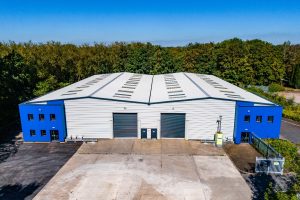UKTI’s fresh export challenge for the region

FOR a second year the UK Trade and Investment hit its target of finding 1,000 new exporters, and regional director Clive Drinkwater is aiming to keep this momentum going every year.
Speaking at an event in Crewe on Friday at the end of another successful Export Week initiative Mr Drinkwater said that despite making good progress, the North West, one of the UK’s most important exporting regions, could still do more.
“It is good news that we have hit another 1,000, but our efforts don’t stop there. There are around 250,000 businesses in the region and the reality is that only around 10% are exporters.
“While the message is that we need more exporters, if every company that is already exporting found just one new market it would add £2bn to the region’s economy, which would have a big impact.
[VIDEO: 721]
“Exporting companies, as I have said before, are more flexible, agile, resilient and make more money. They are, on average, 34% more productive, 75% more innovative, undertake three times as much R&D and are 125 more resilient than businesses that don’t export, and I believe that an assessment of exporting potential should feature in all companies’ plans for 2014.”
He said there was growth potential in central and eastern Europe, as well as high growth markets. The news last week from Cathay Pacaific that it is to resume Manchester-Hong King flights, after a break of 13 years, he said was “outstanding news” and proof that the region is “on the march”.
Closer to home, more than 100 people attended the Export Week event focused on the opportunities in Central and Eastern Europe held at Crewe Hall.
While economic growth within euro zone countries such as France, Spain and Italy is weak, in Poland, the Czech Republic, Bulgaria, Hungary, Bosnia, GDP is expected to be around 3.8% between 2010 and 2015.
UKTI adviser Mark Armitage said: “Central and Eastern Europe is an accessible and growing market for UK firms – you can get a plane ticket to many of these places for the same price as a train ticket to London.
“Bearing in mind that the Berlin Wall came down in 1989 it is remarkable how far these economies have come. There is an opportunity there, unquestionably, but we we are a little bit late to the party, so it is a competitive market.
“There is a growing middle class with aspirations for Western goods, with many joining the EU, there is more political and economic stability, and the fears over bureaucracy and corruption are a lot more than the reality.”
Mr Armitage said there are particular opportunities in transport, IT energy, food retail, pharma and food production.
Kester McMorris, another UK Trade and Investment expert, who works in the organisation’s High Value Opportunities Team, said that there is more than £10bn of investment in the nuclear sector in Central and Eastern Europe alone.
“The opportunity in the sector there [for North West companies] is not just about civil engineering, but for design, finance, legal advice – think about what has recently happened at Hinckley Point here – regulatory, environmental, skill and training.”
He said UKTI was hosting a visit from journalists from Eastern Europe to the region in July to showcase the strength and depth of nuclear expertise here.
To contact UKTI’s High Value Opportunities team, contact hvoteam@ukti.gsi.gov.uk Interested businesses can register at www.ukti.gov.uk
An expert panel of experienced exporters and professional advisers answered questions from the audience on a range of subjects ranging from risk to the possible impact of the UK leaving the EU.
A show of hands in the room on the question of EU membership found overwhelming support for the status quo to be maintained.
Among the panelists was entrepreneur Melissa Burton, managing director of sweet brand Goody Good Stuff, which although a relatively young business, exports to 28 countries.
On the subject of risk, she said: “In my opinion the greatest risk to your business is not exporting, because you are just limiting yourself to one market.”









